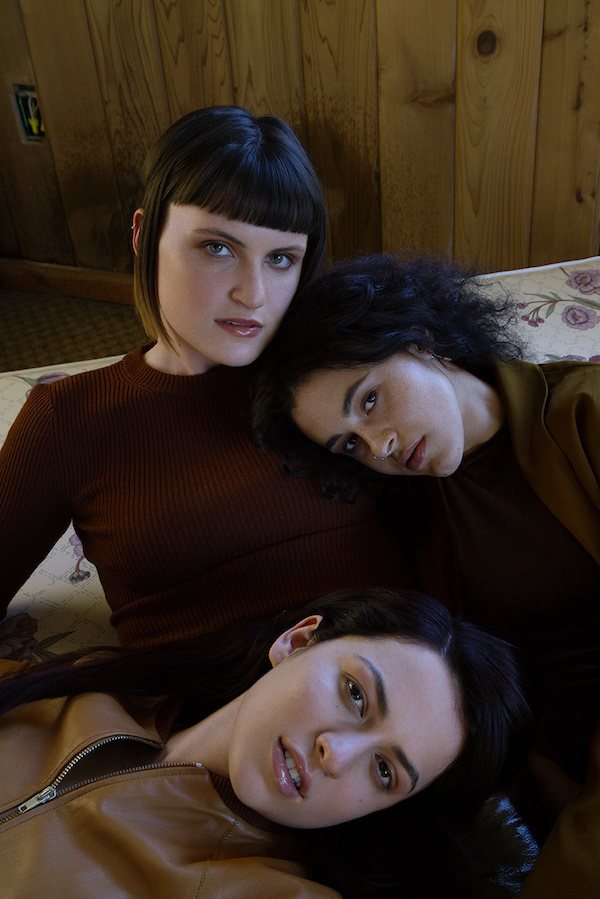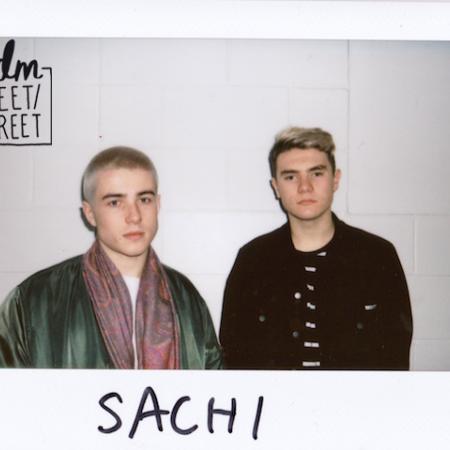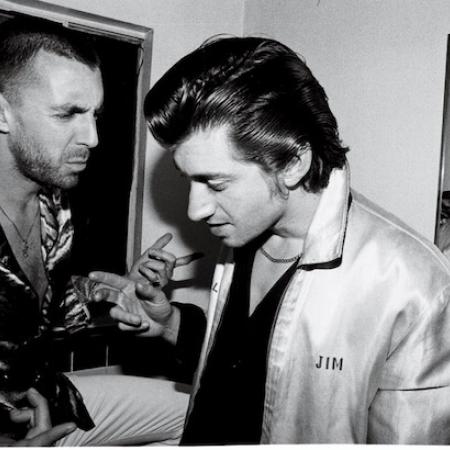MUNA classifies themselves as ‘dark pop’, but for a band whose tunes are languished and bruised, they emit pure light on stage and in person. Songs like ‘Loudspeaker’ and ‘Winterbreak’ started exploding on blogs in early 2016, after a more muted EP release last year. This time around, MUNA’s haunting yet touching lyrics and carefully choreographed aesthetics are winning them both a host of Internet fangirls and approval from mainstream critics.
But the starting point for Katie Gavin, Jo Maskin, and Naomi McPherson was never in appeasing the masses. Instead, their pop is a cathartic melding of both the political and the personal, poppy synths matched with sorrowful words. ‘Loudspeaker’ is the band at its most defiant. It feels like a rallying cry for shrinking violets tired of being pummelled by the everyday. "I don’t know where the blame lies," Gavin admits, "but you better believe I’m not gonna carry it all." There’s a joy in reclaiming your own personal narrative, which all of these women do through their lyrics, but they are also reclaiming pop at its emotional core. Just like Prince’s elegies focused on sex and blackness alike, so do MUNA’s tunes. They are here to tell their story and remind people of the humanity at the core of queerness, blackness, and any other experience of ‘otherness.'
“Don’t step on other people to raise yourself up. Think about humanity, think about other humans. That’s what I like to think about when I write music.”

CDM: Since you released the first EP, you’ve taken down most of those songs from Soundcloud and are putting out this new one. How has your sound changed from when you put out the last EP?
JO MASKIN: We revisited the production, we revisited some recording aspects just to make it a little bit tighter and a little bit bigger where it gets bigger. They’re still the same songs.
CDM: ‘Loudspeaker’ was one that got remixed. It’s such an empowering song and you’ve said before that it’s about oppression and liberation from it. Do you consider yourselves activists through your music?
KATIE GAVIN: It’s an interesting question; like, can you be an activist through pop music? I have talked about this a lot in school, through discussions about feminism and activism. I think pop music has always had a relationship to activism, but I don’t want to say that we’re on the forefront of organizing social change. I would say, I would leave that to other people. I think we have to be really clear about what our role is and where the possibilities start and stop. There are people like DeRay [McKesson] that are literally activists, but I think we try and do what we can to have a relationship with social issues and people.
NAOMI MCPHERSON: We think it’s important for us to use our voices in helpful ways. I think we put the pressure on ourselves to make sure we aren’t excluding anyone and we’re speaking up on the issues that are important. We’ve been to marches and rallies before, but we’re basically doing what’s within our power right now in our careers. Sticking up for people and sticking up for ourselves.
CDM: What kind of activism were you involved with in college?
NAOMI: I was an African American Studies major in college, and a lot of unfortunate political events unraveled while we were in school. Starting kind of with Trayvon Martin, the whole Black Lives Matter movement. It took different shapes both in a macro and micro sense. There were issues we were a part of, in terms of campus policy. I remember the night that the verdict came out in the Michael Brown case, Katie and I walked down Figueroa in downtown Los Angeles and down the 10 Freeway with everybody, just trying to be in solidarity with people. Also at the end of our sophomore year, there were two parties going on at USC [the University of Southern California], one predominantly white, and one predominantly black at the house of this guy who was president of the Black Student Union – his name is Nate Howard, he’s an activist and motivational speaker now. There was a phone call to the LAPD and the LAPD brought, like, 79 cops to shut down the party with mainly black students. A lot of kids were arrested, a lot of people were manhandled. It was a really horrifying night for a lot of people.
KATIE: It was very traumatizing.
NAOMI: A group of students came together to try and pick up the pieces and figure out how we were going to use this, because there was a moment where the spotlight was on us. We wanted to try and use it to affect change. Unfortunately, USC hasn’t changed much in terms of the way it treats its students of colour and people of colour in the community surrounding USC. They were putting gates around the entire campus to try and complete the message they were sending to the community of, “You’re not welcome here.” That was the last thing we did - try to petition to get them to take down the gates. My heart goes out to people who try and stay in the realm of social activism, because it’s very tiring and thankless work that they do. You have to be really, super savvy.
CDM: I really loved when you called your music “intersectional” in a recent interview with Stereogum. It’s a term that’s used a lot lately in academia, but it was an amazing reminder of how personal intersectionality is to people’s lives. What does intersectionality mean to you in regards to art?
NAOMI: I think that the phrase “the personal is political” applies to everything you do in life. If what you do is music, and what you’re writing about and experiencing is personal, the fact that we’re putting it out there politicizes it. That necessitates us taking into consideration our different identities within the group but also the plethora of identities of whoever’s out there on the Internet or at shows listening to our music. I think we want to take care of people in that way, or at least try to. The three of us have very different upbringings and very different identities, so I think it makes it past the three of us and none of us feel excluded by it, then we kinda feel comfy putting it out there for other everybody.
JO: I see ‘intersectional’ laying next to the term ‘humanist’ in that we want our music to be a liberating force, but I don’t think liberation is true liberation if it comes at the hand of putting someone else down. Unfortunately, in the world of pop music, particularly with white artists, a woman might do something that’s 'empowering', but then you realize it’s racist as fuck. Don’t step on other people to raise yourself up. Think about humanity, think about other humans. That’s what I like to think about when I write music.
CDM: You refer to yourself as ‘dark pop’ and have been promoted as a pop act. What constitutes ‘pop’ is always evolving. How do you feel about pop and your place within that landscape?
JO: The reason I like pop is that anyone can be involved in pop, and anyone can appreciate pop. It’s not a genre that excludes anyone and a lot of people can relate to it. But earlier someone on Twitter said, “Pop isn’t a genre you dummies; it’s just music that touches people.” That’s real. That’s all we really wanna do. Pop is changing in a lot of ways. Rihanna’s last album was weird but that’s still pop, and we wanna be part of something that’s not necessarily part of the norm but can be appreciated by many people. The thing I like about pop is that you can have a message that is universal because it’s easier to digest in a way, than a lot of other styles of music.
CDM: I love that you list Pat Benatar, Prince, and The Smiths as huge influences. Why do you think ‘80s and ‘90s music was so magical? Sonically a lot of that is coming back, and also stylistically with normcore, etc. Why are we gravitating towards it now, and what is it about that era that’s so appealing?
NAOMI: I think that the ‘80s was kind of the real start of synth-pop and big pop bangers, not just coming from pop acts, if that makes sense. New Order is not a mainstream pop act, or neither were The Smiths. Prince, who was probably labeled as an R&B artist, made so many bangers. It’s just these huge sounds – phat grooves, giant synths, atmospheric guitar sounds – have always appealed to me. It just sort of triggers something in your secondary lizard-brain. It releases so many serotonin chemicals.
KATIE: I’ve been saying to people that I really like that there’s so much crazy fucking shit happening in the world right now, we might get a totally new genre of music soon. I think that music reflects the time that we’re in. When you look at the ‘80s and the kind of fantastic sounds that come from that decade, it was really an explosion. Pop musicians gave people so many new experiences in the ‘80s. When you look at what was going on politically and socially, the AIDS crisis, broken windows theory, Reaganism, the times match up in a lot of ways in the way we’re being sold fear. There may be a connection between everyone being scared and needing to hear big, melodramatic, escapist pop music. These things wouldn’t come back unless there was a purpose for us, you know?
NAOMI: During World War I, it was that same kind of concept - listening to music that matches the time we’re in.
JO: A lot of pop artists now are making big melodramatic music now because they consistently avoid the political. Thankfully, we have a lot of artists that don’t avoid that, like Rihanna and Beyoncé come to mind – huge popstars who have put themselves out there in that way in their music and the way that they speak about it. I think it’s important to not just make big, beautiful songs but also to talk about some real shit to people. Because I want people to feel comforted by our music, I want them to escape within it, but at the same time I don’t want them to be nihilists.
CDM: Like there’s a difference between being comforted and feeling comfort.
JO: 100%. We say this all the time, “The purpose of art is to comfort the disturbed and disturb the comfortable.”
CDM: For our last question, do you have any specific plans to visit New Zealand?
NAOMI: I want to be there! I have cousins that live there. They’re Maori. They play rugby and they’re really tough, but they’re 10. But hopefully we’ll go soon!
MUNA’s EP ‘Loudspeaker’ is out now - click here to purchase via iTunes.
Watch the ‘Winterbreak’ music video below…



 MUNA
MUNA







